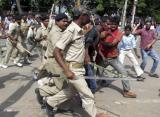Patna, Oct 28: People thrash a man whom the police detain and take away for questioning after a bomb blast outside the venue of BJP's Hunkar rally in Patna on Sunday.

"One of the accused, who is being considered as the mastermind, has been arrested till now. He has confessed how the planning took place," SSP, Patna, Manu Maharaj said.
Three-four suspects have been detained, he said, adding, "We are in the process of interrogation so things will be clear very soon".
Maharaj said there were six-seven persons accompanying the alleged mastermind.
"Based on that information, we conducted raids. Information was given to Ranchi and subsequently our teams have gone there," he said.
Patna city SP said investigation is going on "so we can't divulge a lot of details. The accused has confessed about the crime, how it happened. He told us that six-seven teams came to Gandhi Maidan and surroundings of Patna and how they planted the bombs".
Five persons were killed yesterday in seven low intensity serial blasts in Patna of which six bombs went off in and around the venue of Narendra Modi's mega rally at Gandhi Maidan shortly before his address before a huge gathering.
A total of 83 people were also injured in the bomb explosions in which timers were also used.
Tens of thousands of people had gathered at Gandhi Maidan to hear Modi.





Comments
Add new comment